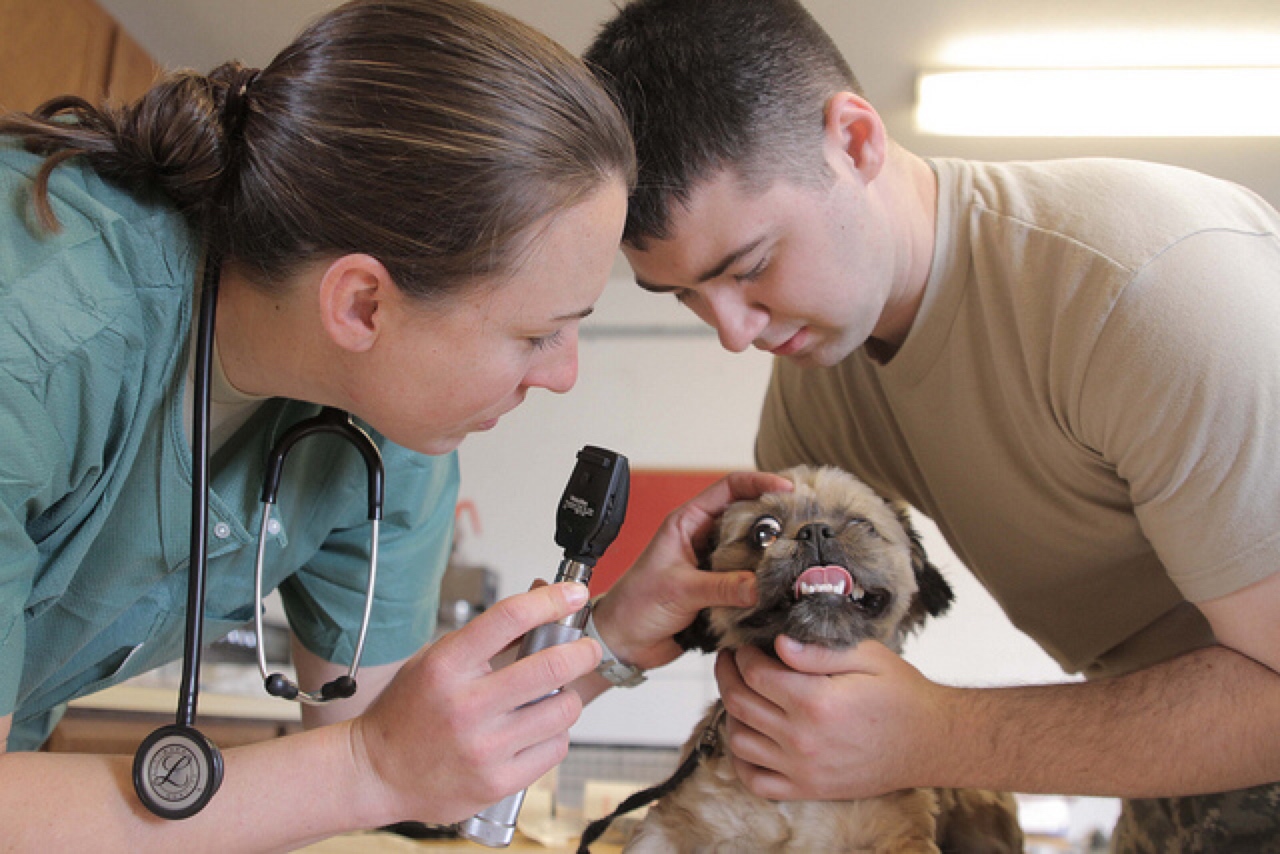Table of Contents
What’s the quick answer? Preventative care and early detection! Although many types of cancer in dogs are genetically influenced and unpreventable, regular vet check-ups and at-home exams are the key to early diagnosis, which can save lives. There are also several lifestyle changes you can make for your pet to ensure they’re living life to the healthiest.
Don’t skip check-ups.

Also known as a wellness examination, your dog or cat’s yearly veterinary check up is not something to be missed. Many pet parents fear the fee from wellness visits, which isn’t covered under most pet insurance plans. According to Veterinary Centers of America, the largest pet healthcare provider in the country, your pet needs check ups at different rates depending on their life stage.
Puppies should see a vet monthly to monitor their growth and keep an eye on mischief-makers. Contrary to common belief, dogs do not age seven years for every one human year; by one year old, a puppy is comparable in age to a 15-year-old human. The maturation process slows, and by two years old dogs are roughly 25 human years. Adult dogs need annual wellness examinations, which doesn’t include appointments for emergencies or acute medical issues. After two years old, each human year is equals about 5 dog years.
Large dogs do age faster than small dog breeds; a 6-year-old dog is considered middle-aged for small to medium breeds, but geriatric for larger pets. If you have any concerns regarding the frequency of your pet’s wellness exams, ask your vet! Many clinics will offer to schedule your appointment before you leave, including a reminder call.
Stick to a healthy diet and exercise.

For both pets and humans, exercise has been linked to a reduced cancer rate. In humans, colorectal and lung cancers have been linked to a reduced risk of 30 to 40 percent and 20 percent, respectively. A pet who’s strong going into cancer treatment – typically chemotherapy or radiation – will be stronger coming out the other side. There are even cancer diets for dogs undergoing treatment, rich in health fats and fatty acids, with an emphasis on protein and limiting carbs.
Cachexia is a metabolic condition common among dogs fighting cancer, including loss of appetite, fatigue, impaired immune function, and weight loss. As cachexia progresses to the third stage, body fat and muscle mass begin to drop – in many cases, cachexia, not cancer, is the cause of death. Ensure your dog is getting enough protein and carbohydrates to be properly fueled, and pay attention to sudden changes in weight and appetite.
Avoid carcinogens.
Just as in humans, exposure to carcinogens – defined as a known cancer-causing substance – increases your pet’s risk of developing cancer. Secondhand tobacco smoke is often responsible for mouth cancer in dogs; particles in the air land on the pet’s fur and are ingesting during the cleaning process. Asbestos may also be a culprit and is equally harmful to humans, although most has been removed from old buildings in the last 20 years.
Herbicides, insecticides and pesticides are also carcinogens. Recently, the active ingredient in RoundUp – one of the most popular pesticides in backyards and commercial farming – was found to be a “probable carcinogen” by the UN World Health Organization. A few days later, a second study found glyphosate can lead to antibiotic resistance.
To be better safe than sorry, avoid using chemicals in areas accessible to pets. Dogs are especially vulnerable to pesticide use on grass, where they frequently find a stomach-soothing snack. Pesticide poisoning in dogs is fairly common but is a serious medical emergency – seek immediate veterinary care if you suspect your dog has ingested chemicals.
Spay or neuter your pet.
There’s widespread evidence that spaying or neutering your pet can greatly reduce the risk of developing certain cancers. “If a female dog is spayed before her first heat cycle, the chance of the dog developing mammary cancer is less than 0.05 percent,” says Dr. Stacy Eckman, a clinical assistant professor at Texas A&M College of Veterinary Medicine & Biomedical Sciences. During spaying – a minor surgical procedure removing the female reproductive organs – the uterus and ovaries are removed, which eliminates the risk of developing cancers in these organs.
Neutered male dogs have no risk of testicular cancer – alteration removes the animal’s testes – and reduces testosterone levels. This is why fixed pets are less likely to roam or be aggressive, but also leads to underdevelopment of the prostate gland, which is a site of cancer.
Limit sun exposure.
The most common cause of tumors in dogs, skin cancer can be caused by exposure to ultraviolet rays, among other risk factors. Hairless areas like paw pads, noses, inside the ears, and the belly/groin are all sensitive to sun damage. Dogs with white or thin coats may also be susceptible to UV ray exposure.
Do regular skin checks on your pup, as you would (or should!) for yourself. Look for any raised or red areas, especially those with irregular borders or that you haven’t seen before. While benign growths or tumors – like skin tags, moles or lipomas – are common among dogs, have any suspicious growths inspected by your vet to be sure.
When outdoors with your dog, always have a shaded area to escape to, which can also prevent heat stroke. Dogs with thin or white fur may benefit from protective clothing, like Playapup’s SPF 50+ infused shirt, which is basically a doggie surf rash guard. Non-toxic, lick-safe spray sunscreen for dogs is available from Epi-Pet. The only sunscreen approved for use in animals, you should never use human sunscreen on your pet! Doggles – dog sunglasses – are also available and provide sun protection for pets with light eye colors or white faces.
The content is not intended to be a substitute for professional veterinarian advice, diagnosis, or treatment. Always seek the advice of your veterinarian or other qualified health provider with any questions you may have regarding a medical diagnosis, condition, or treatment options.
As pet parents, we want our puppies and dogs to be happy and healthy, so a diagnosis of cancer can be devastating. By enrolling in pet health insurance prior to symptoms or signs of illness, your vet bills for this chronic condition can be covered up to 90%. Sign up today by first getting a quote.








